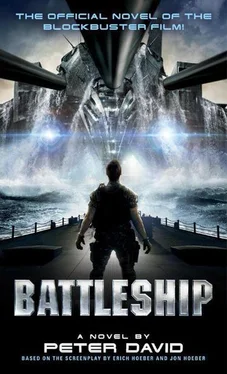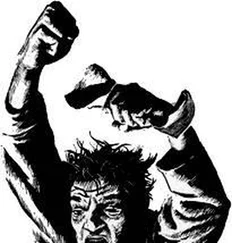Peter David - Battleship
Здесь есть возможность читать онлайн «Peter David - Battleship» весь текст электронной книги совершенно бесплатно (целиком полную версию без сокращений). В некоторых случаях можно слушать аудио, скачать через торрент в формате fb2 и присутствует краткое содержание. Город: New York, Год выпуска: 2012, ISBN: 2012, Издательство: Del Rey, Жанр: Боевая фантастика, на английском языке. Описание произведения, (предисловие) а так же отзывы посетителей доступны на портале библиотеки ЛибКат.
- Название:Battleship
- Автор:
- Издательство:Del Rey
- Жанр:
- Год:2012
- Город:New York
- ISBN:978-0-345-53538-2
- Рейтинг книги:4 / 5. Голосов: 1
-
Избранное:Добавить в избранное
- Отзывы:
-
Ваша оценка:
- 80
- 1
- 2
- 3
- 4
- 5
Battleship: краткое содержание, описание и аннотация
Предлагаем к чтению аннотацию, описание, краткое содержание или предисловие (зависит от того, что написал сам автор книги «Battleship»). Если вы не нашли необходимую информацию о книге — напишите в комментариях, мы постараемся отыскать её.
Battleship — читать онлайн бесплатно полную книгу (весь текст) целиком
Ниже представлен текст книги, разбитый по страницам. Система сохранения места последней прочитанной страницы, позволяет с удобством читать онлайн бесплатно книгу «Battleship», без необходимости каждый раз заново искать на чём Вы остановились. Поставьте закладку, и сможете в любой момент перейти на страницу, на которой закончили чтение.
Интервал:
Закладка:
She shushed him and pointed toward the other side of the room. They turned their attention there as Nogrady, standing behind Carlson, rested a hand on the young technician’s shoulder. “Send it,” he said.
Carlson inputted the codes that would bring the entire facility online. There was a pause, no more than half a heartbeat, but enough time for Zapata to realize that if everything suddenly short-circuited and went dark, he wouldn’t be the least bit choked up about it.
Instead all the instrumentation came online perfectly. The project had gone live.
The next sound they heard was a hollow popping noise. One of the scientists had opened a bottle of champagne. The cork flew, ricocheted off a far wall and bounced off Zapata’s forehead as if it had eyes. Nobody except Dorn noticed, and she put up a hand to suppress a laugh. Zapata forced a smile.
The very first glass to be filled with champagne was handed over to Nogrady. He held it up and announced, “And that’s how it starts.”
Similar scenes were simultaneously being enacted in Morocco and Hawaii. In both those locations, as well as this one, the radar dishes pinged to life and began sending out a steady signal. Thousands of miles over the planet, satellites were orbiting, their panels adjusting to receive the transmissions and beam them into the depths of space.
It was the astronomical equivalent of a message in a bottle, but at least it was something.
Zapata watched all the relays, the steady pulsing lines moving with perfect synchronization across the screens, indicating that everything was processing correctly. Everyone else, even the enticing Dorn, was part of the celebration, Dorn clapping her hands and “whooping” as if she were at a football game. Only he remained at his station, watching the results of the initial pulses with cold, hard eyes.
Get ready to make history .
Nogrady’s words came back to Zapata. Yeah. That’s all well and good. But there’s a thin line between making history, and being made history. And I hope to God we haven’t crossed it .
HONOLULU, 2006
The Hideaway was kind of a dump. The patrons liked it that way. It meant that the idiot tourists tended to stay the hell away from it, and it could be someplace for people who were in the know to hang out.
It was a hotel bar, attached to a hotel that was somewhat of a fleabag itself. But it was cheap, which was something you couldn’t say about a lot of hotels in Honolulu, and that was enough to prompt a few tourists—who didn’t care that the neighborhood was run-down—to book rooms there. Not a lot, but enough to keep the place in business. It was also a popular hangout for the U.S. Navy, for reasons that no one could quite determine. The general suspicion was that the tradition had its roots somewhere back in the days of the Pearl Harbor bombing. Supposedly key Navy personnel had snuck off the base and were drinking at the Hideaway when the Japanese attacked. Consequently they survived, and the place had maintained a charmed existence ever since.
At least that was how the story went.
The cocktail waitress looked worn and haggard, as she tended to be when she was approaching the end of her shift. Her straight black hair was tied back in a bun, but there were random strands hanging in her face. She wore a blue flowered sarong—since that was what the tourists expected—but she moved like someone who wasn’t particularly comfortable in it. She’d rather be wearing a T-shirt and shorts any day.
Pouring whiskey into two shot glasses, she placed them onto a tray and headed over toward a table where a couple of brothers, the Hoppers, were seated. They’d both already had more alcohol than they really should have, but they didn’t care in the least. All that mattered to them was that the whiskey arrived in time, because the clock was ticking down. There were a few other customers in the Hideaway, but most of them were pretty much drunk anyway, oblivious of one another’s existence. “I love my life,” she muttered unconvincingly.
The Hopper brothers were waiting for her, a bedraggled-looking cupcake sitting in front of them, a single pathetic candle sticking lopsidedly out of it, like the Leaning Tower of Pisa.
Stone Hopper was tall and lean, with a head of thick blond hair, a wide nose and plain, open eyes that seemed incapable of hiding a lie. His default expression, indeed his entire attitude, was one of patient understanding. But that could, at a moment’s notice, harden into a look of total command. Considering he was an officer in the U.S. Navy, it was a capability that served him in good stead.
His brother, Alex, was a different story. Barrel-chested and well-muscled, he maintained a look of permanent party-boy dishevelment. On any given day he had at least three days’ growth of beard, with his overlong brown hair frequently hanging in front of his round face. A T-shirt that read Burnt Demolition Co . was stretched across a ripped chest that had gotten that way mostly because he had formerly worked at the place emblazoned on his shirt. The job was gone, but the shirt remained. He had long ago disdained his first name, embracing his surname and preferring to be addressed simply as “Hopper” or “Hopps.” When asked, he would cavalierly explain that “Alex” was a lame-assed name compared to “Stone” and he would leave it at that. If asked to explain beyond that, all he’d give you was a stare equal to Stone’s look of command.
Stone was squinting, watching as best he could—considering his inebriated state—the second hand sweeping around on his wristwatch until it finally hit midnight. Then, very portentously, he announced, “This year, Hopps, I’m quoting from—and this one took me awhile—the great, late Coach John Wooden.”
“Who?” said Hopper.
“John Wooden!” Stone sounded surprised, even a bit hurt that he had to explain it further. “Great college basketball coach! Maybe the greatest coach ever!”
“Greatest coach?” Hopper regarded him with a raised eyebrow that was pretty much all the dubiousness that he could muster at the moment.
“One of ’em,” said Stone.
Hopper considered that, clearly not accepting the proposition. “If he was the greatest coach, why’d he coach college? Couldn’t cut it in the big show?”
Stone was offended at the notion that his younger brother would challenge him on this point. “ ’Cause he was a purist and an educator. And,” he added as if this was the slam dunk of his claim, “a man of honor.”
“So he was broke,” said Hopper.
Stone raised his voice to drive home his assertion. Because when one is having trouble convincing someone of the rightness of one’s belief—and facts are being thrown in one’s face that would seem to undercut those beliefs—it was always best to up the volume. “He was one of the greatest men who ever lived .”
“Broke.”
Stone was both offended and dismayed at his brother’s attitude. “No, actually, Hopper, you’re broke,” he said pointedly. “John Wooden died rich in respect, and golden in reputation.”
Hopper snorted, as if Stone’s extolling of Wooden’s virtues was simply proof of what Hopper was saying. “But real low in cash.”
“For someone who only cares about how inflated a person’s wallet is, you’ve done a pretty piss poor job of living up to—” He stopped himself and shook his head. This was clearly a pointless discussion. Hopper was never going to get it; all he’d do was dig in to the notion that nothing mattered but money, failing to realize that holding that up as an indicator of a man’s value reflected rather poorly on his own sense of worth. “Light your cupcake and raise your glass,” he said with grudging acknowledgment that it was time to move on.
Читать дальшеИнтервал:
Закладка:
Похожие книги на «Battleship»
Представляем Вашему вниманию похожие книги на «Battleship» списком для выбора. Мы отобрали схожую по названию и смыслу литературу в надежде предоставить читателям больше вариантов отыскать новые, интересные, ещё непрочитанные произведения.
Обсуждение, отзывы о книге «Battleship» и просто собственные мнения читателей. Оставьте ваши комментарии, напишите, что Вы думаете о произведении, его смысле или главных героях. Укажите что конкретно понравилось, а что нет, и почему Вы так считаете.












